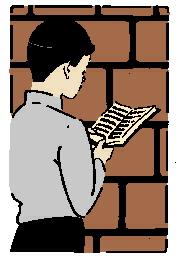 The Second Part of the Three Weeks Halachos concern the Nine Days in the month of Av.
The Second Part of the Three Weeks Halachos concern the Nine Days in the month of Av.
LAUNDERING
1. Askenazic custom is to not launder clothing and the wearing of freshly washed clothes. These restrictions do not apply to small children – infant or older children, as according to Rema, children’s clothing which continually gets soiled may be washed. [1]
2. Some poskim however limits the age of children whose laundry is allowed, up to the age of 3. Other poskim do not distinguish. [1] If you are washing, try to do it in a private location, and not a public place such as a laundromat, if possible. [1]
3. For those authorities who prohibit laundering of children’s clothing and giving them freshly washed clothes altogether, some forbid this for the entire 9 days, others restrict it only during the week where Tisha B’Av occurs. [1]
REPAIRING GARMENTS
1. According to [2], one is permitted to repair torn garments during the 9 days.
BATHING & SWIMMING
1. Askenazic observance includes prohibition of bathing (hot and cold water) for either men or women during the 9 days. Washing oneself (bath or shower) for health reasons, to remove dirt and perspiration, is permitted. [1]
2. Children of the age of chinuch should not swim during the 9 days. [2] Some poskim permit children below bar/bas mitzvah to bathe in cold water or go swimming during these days. Others only forbid doing this in public. [1]
[ Moderator’s note: Moderator has found that according to other poskim, swimming lessons are allowed even during the 9 days, but not swimming for pleasure. ]
4. According to [2], one is not permitted to bathe or shower during the 9 days, but permits this for children in order to remove dirt or perspiration.
EATING MEAT & DRINKING WINE
1. There is a prohibition on eating meat & chicken and drinking wine during the 9 days. However, according to Magen Avraham, this prohibition does not apply to children below the age of understanding. Other poskim permits this food for toddlers and small children when it is done for a mitzvah such as Havdalah (see #5 below). [1]
At a meal that is considered a mitzvah, such as a bris (circumcision), a pidyon haben (redemption of the first born), or a Siyum (conclusion of a Talmud tractate), it is permitted to eat meat and drink wine. [3]
2. Beginning Rosh Chodesh Av until after Tisha B’Av (i.e. 10 of Av), Ashenazic custom forbids eating meat, poultry, or any food with cooked meat (e.g. stew), or even if no meat is actually present (e.g. soups), and forbids drinking wine or grape juice. Sephardic custom restrict this only during the week of Tisha B’Av. [2]
3. According to all opinions, the restriction against eating meat/poultry does not apply to children whose health will be compromised otherwise and who will not eat any other food. [1] [2]
4. If a child is eating a Shabbos meal Friday afternoon (after plag haMincha), one is permitted to feed the child meat or poultry.
Plag haMincha is 1 1/4 hours before sunset. However, this is not measured in 60-minute hours, but rather in seasonal hours, by dividing the daylight time into 12 equal parts. On a summer day, which has 15 hours between sunrise and sunset, each seasonal hour is 75 mins. long. [2]
5. There is a custom to give the Havdalah wine to a child to drink. This child who drinks must have reached the age of chinuch in reciting brochos , but not the age of understanding the concept of mourning, i.e. 7 or 8 yo.
When the child drinks the wine, he should not recite his own bracha, since an adult recited the bracha only on the child’s behalf.
If the child this age is not available, then an older child should drink the wine.
If any child is unavailable, the adult himeself should drink the wine. [2]
OTHER PROHIBITIONS
There are other prohibitions that are beyond the scope of Chinuch, that are for grown-ups. For those, the moderator recommends other sources, such as [3].
References
[1] A Parent’s Guide to Teaching Children Mitzvot by Rabbi Shmuel Singer
[2] Children In Halachah by Rabbi Simcha Bunim Cohen.
[3] Kitzur Shulchan Aruch translated by Rabbi Avraham Davis
 The Second Part of the Three Weeks Halachos concern the Nine Days in the month of Av.
The Second Part of the Three Weeks Halachos concern the Nine Days in the month of Av.